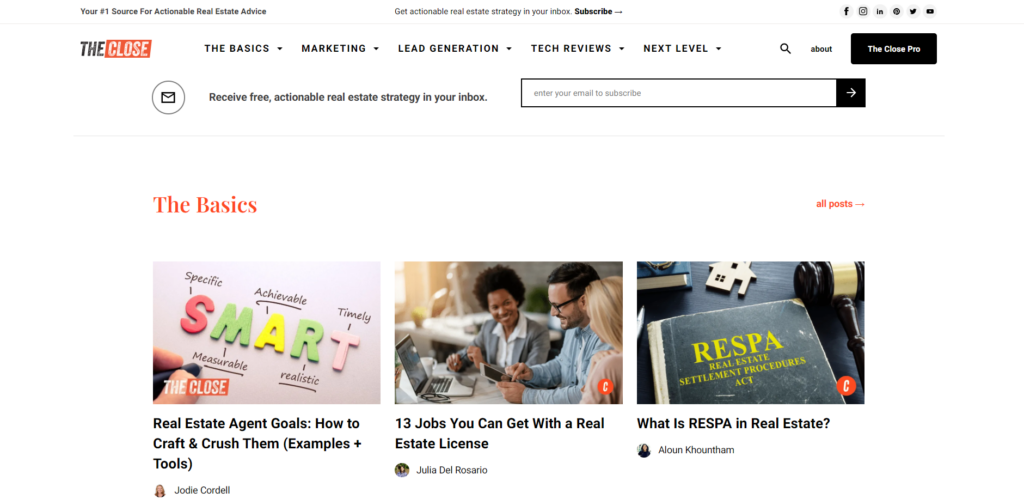Mastering the art of real estate content marketing can propel your business to new heights. At Flying V Group (FVG), we’ve leveraged this powerful tool not only to attract but also convert leads into significant sales. From our extensive hands-on experience, we’ve distilled five invaluable lessons that have consistently delivered outstanding results. These lessons, rooted in real-world applications, offer actionable strategies designed to elevate your marketing game. By implementing these insights, you’ll transform your content into a potent driver of business growth. Let’s delve into these lessons and redefine your approach to real estate content marketing.
- Real Estate Content Marketing Lesson 1: Understand and Define Your Target Audience
- Real Estate Content Marketing Lesson 2: Leverage Local SEO and Hyper-Local Content
- Real Estate Content Marketing Lesson 3: Diversify Content Formats
- Real Estate Content Marketing Lesson 4: Consistent Content Calendar and Strategic Planning
- Real Estate Content Marketing Lesson 5: Engage and Educate with High-Value Content
- Elevate Your Real Estate Content Marketing with Flying V Group
- FAQs
Real Estate Content Marketing Lesson 1: Understand and Define Your Target Audience
A deep understanding of your target audience is the cornerstone of effective real estate content marketing. At Flying V Group (FVG), we’ve found that creating detailed buyer personas is essential to crafting content that resonates.
Importance of Creating Detailed Buyer Personas
Buyer personas are semi-fictional representations of your ideal clients based on market research and real data. These personas help you understand your audience’s needs, behaviors, and concerns, enabling you to tailor your content to meet their specific demands.

Techniques for Identifying Pain Points and Needs
To accurately define your target audience, you must delve into their pain points and needs. Here are some effective techniques:
- Social Media Listening: Platforms like Reddit and Facebook groups are goldmines for understanding what potential buyers are discussing. Pay attention to the questions they ask and the problems they highlight.
- Surveys and Interviews: Direct feedback from your existing clients can provide insights into common challenges and preferences.
- Analytics and Insights: Use tools like Google Analytics to understand how visitors interact with your content and what topics generate the most engagement.
Tailoring Content for Different Buyer Personas
Once you have a clear picture of your target audience, customize your content to address their specific needs:
- First-Time Homebuyers: Create beginner-friendly guides that explain the home-buying process, financing options, and what to expect during inspections.
- Seasoned Investors: Provide advanced content such as market analysis, investment strategies, and tips on maximizing ROI.
- Families Looking to Relocate: Offer neighborhood guides, school information, and community resources.

By understanding and defining your target audience, you can create compelling content that speaks directly to their needs, ultimately driving engagement and conversions.
Real Estate Content Marketing Lesson 2: Leverage Local SEO and Hyper-Local Content
Harnessing the power of local SEO can significantly distinguish your real estate business from larger, national competitors. By focusing on local data and insights, you can create content that directly appeals to your target audience.
The Power of Local SEO
Local SEO helps your business appear in search results when potential clients look for real estate services in specific geographic areas. This targeted approach not only boosts your visibility but also attracts high-intent visitors who are more likely to convert.
Strategies for Incorporating Local Data
Incorporating local data and insights into your content can greatly enhance its relevance and appeal. Here are some strategies to achieve this:
- Local Market Trends: Regularly update your audience with current market trends, such as property values, sales statistics, and emerging neighborhoods.
- Community Highlights: Showcase unique aspects of the community, including local events, popular restaurants, and recreational activities.
- Local Expert Interviews: Feature interviews with local real estate agents, city planners, or business owners to provide insider perspectives.
Examples of Hyper-Local Content
Creating hyper-local content ensures your message resonates with the specific needs and interests of your audience:
- Neighborhood Guides: Develop comprehensive guides that detail amenities, schools, parks, and transportation options in various neighborhoods.
- Local Event Coverage: Write about upcoming events or recent happenings in the community to keep your audience informed and engaged.
- Property Spotlights: Highlight unique properties in your area, discussing their features and the benefits of their locations.
By leveraging local SEO and hyper-local content, you can position your real estate business as the go-to source for valuable, community-specific information, ultimately driving more traffic and conversions.
Real Estate Content Marketing Lesson 3: Diversify Content Formats
In today’s digital landscape, using a mix of content formats is essential for engaging a diverse audience and catering to different stages of the buyer’s journey.
The Need for a Mix of Content Types
A varied content strategy helps capture the attention of potential clients through different mediums. This includes:
- Blog Posts: Detailed articles on topics like market trends and buying tips.
- Videos: Engaging visual content such as property walkthroughs and neighborhood tours.
- Infographics: Easy-to-digest visuals that explain complex data or processes.
- Podcasts: In-depth discussions with real estate experts.
- Email Newsletters: Regular updates that keep your audience informed and engaged.

Tips on Creating Engaging and Visually Appealing Content
To ensure your content stands out, focus on creating high-quality and visually appealing materials:
- Property Walkthroughs: Use high-definition videos to showcase the features of properties, providing a virtual tour experience.
- Neighborhood Tours: Create videos or photo series that highlight the key attractions and amenities of different neighborhoods.
- Expert Interviews: Conduct interviews with real estate professionals to provide valuable insights and establish credibility.
Catering to Different Stages of the Buyer’s Journey
Different content formats are more effective at various stages of the buyer’s journey:
- Awareness Stage: Use blog posts and infographics to attract potential buyers by providing general information and market insights.
- Consideration Stage: Engage prospects with videos and podcasts that delve deeper into specific topics, such as property features and local amenities.
- Decision Stage: Utilize email newsletters and detailed property walkthroughs to provide the final push needed for buyers to make a decision.
By diversifying your content formats, you can effectively engage your audience at every stage of their journey, making your real estate marketing efforts more robust and impactful.
Real Estate Content Marketing Lesson 4: Consistent Content Calendar and Strategic Planning
Maintaining a consistent content calendar and strategic planning is crucial for effective real estate content marketing. It ensures that your audience receives a steady stream of valuable content, keeping them engaged and informed.
Importance of a Content Calendar
A well-organized content calendar helps you plan and schedule your content in advance, ensuring regular updates and a variety of topics. This consistency builds trust and keeps your audience coming back for more.
- Planning: Schedule posts in advance to avoid last-minute rushes.
- Variety: Ensure a mix of content types and topics to cater to different interests and stages of the buyer’s journey.
Aligning Content with Seasonal Trends and Market Fluctuations
To keep your content relevant and timely, align it with seasonal trends and market changes:
- Seasonal Trends: Create content around seasonal events like holiday buying tips or summer home maintenance.
- Market Fluctuations: Address current market conditions, such as changes in interest rates or housing supply, to provide timely advice to your audience.
Conducting Regular Content Audits
Regularly auditing your content helps identify gaps and opportunities for improvement. This process ensures your content remains up-to-date and continues to meet the needs of your audience.
- Identifying Gaps: Look for missing topics or underperforming areas that need more attention.
- Repurposing Content: Update and republish older content to keep it fresh and relevant, maximizing its value.
By implementing a consistent content calendar and strategic planning, you ensure that your content remains relevant, engaging, and aligned with the ever-changing real estate market, ultimately driving better results for your business.
Real Estate Content Marketing Lesson 5: Engage and Educate with High-Value Content
Creating high-value content that engages and educates your audience is essential for successful real estate marketing. This approach builds trust and positions you as an authority in the industry.
Focus on Educational Content
Providing valuable, educational content addresses the common questions and concerns of your audience. This not only attracts potential clients but also keeps them coming back for more.
-
- Mortgage Advice: Write articles that explain mortgage options, the application process, and tips for securing the best rates.
- Investment Strategies: Share insights on real estate investment strategies, market analysis, and tips for maximizing returns.

Use Storytelling
Storytelling makes your content more engaging and relatable. By weaving narratives into your articles, you can capture the interest of your readers and make complex information easier to understand.
- Client Success Stories: Share stories of clients who successfully bought or sold homes with your help.
- Personal Anecdotes: Include personal experiences and lessons learned to humanize your brand.
Best Practices for SEO and User Experience
Optimizing your content for SEO and user experience ensures it reaches a wider audience and provides a pleasant reading experience.
- Readability: Use clear headings, bullet points, and short paragraphs to make your content easy to read.
- Calls to Action (CTAs): Include compelling CTAs that guide readers toward the next step, whether it’s contacting you for more information or subscribing to your newsletter.
- Multimedia Elements: Enhance your content with images, videos, and infographics to make it more visually appealing and engaging.
By focusing on creating high-value, educational content, using storytelling techniques, and optimizing for SEO and user experience, you can effectively engage your audience and establish yourself as a trusted resource in the real estate industry.
Elevate Your Real Estate Content Marketing with Flying V Group
By implementing these five lessons, you can transform your real estate content marketing strategy and achieve remarkable results. At Flying V Group (FVG), we specialize in crafting compelling, data-driven content that engages, educates, and converts. Our expertise in understanding target audiences, leveraging local SEO, diversifying content formats, maintaining consistent content calendars, and creating high-value content positions us as the ideal partner for your real estate marketing needs. Let us help you navigate the complexities of real estate content marketing and drive your business to new heights. Contact FVG today to get started on your path to success.
FAQs
What is real estate content marketing?
Real estate content marketing involves creating and distributing valuable content to attract and engage potential buyers and sellers. This includes blogs, videos, infographics, and more, aiming to build trust and drive traffic to your real estate business.
Why is local SEO important in real estate content marketing?
Local SEO enhances your visibility in specific geographic areas, making it easier for local buyers and sellers to find you. It differentiates you from larger competitors by targeting a more precise audience with relevant, location-specific content.
How can storytelling benefit real estate content marketing?
Storytelling makes your content more engaging and relatable, helping to capture the interest of your audience. By sharing client success stories and personal anecdotes, you build a stronger connection with potential clients, making complex information more digestible.
What types of content should I include in my real estate marketing strategy?
A diverse content mix, including blog posts, videos, infographics, podcasts, and email newsletters, is crucial. This variety caters to different audience preferences and stages of the buyer’s journey, ensuring broader engagement and better results.
How often should I update my real estate content?
Regular updates are essential to keep your content relevant and accurate. Aim to refresh your content at least quarterly, conducting audits to identify gaps and opportunities for repurposing or updating existing materials to maintain its effectiveness.






0 Comments